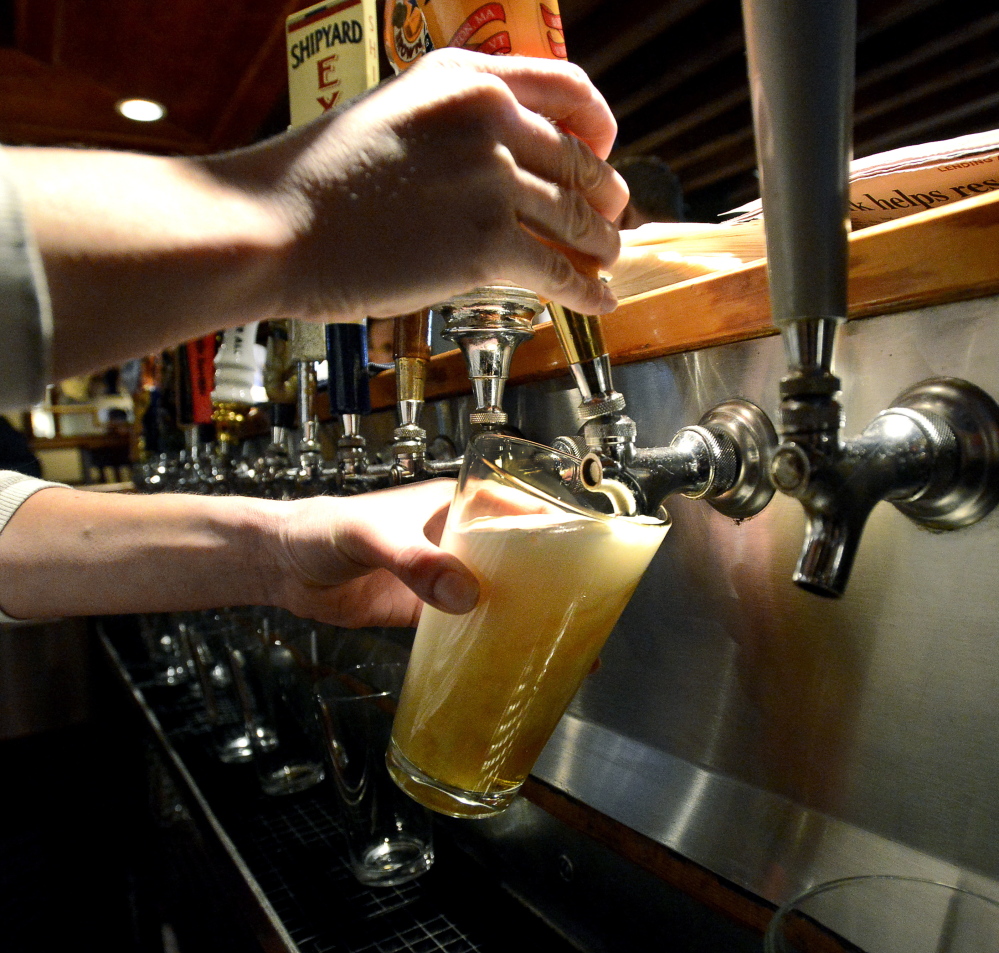Rest easy, thrifty and thirsty Mainers. A state legislator is looking out for your wallet – and your buzz.
Sen. John Patrick, D-Rumford, has introduced legislation to ensure that in barrooms, tap houses, taverns and dives, a beer advertised as a pint will be 16 ounces, and not a drop less.
Prodded to take action after “five or six” residents complained to him, Patrick said he hopes to instill some honesty with every tip of the tap handle.
“It’s like truth in advertising,” said Patrick, who recalled the good old days when a package of bacon was a pound, not 13 ounces.
“As with any other standardized thing, if you buy something of a specific measure, you expect to get that much,” Patrick said.
Like most bills early in this session, Patrick’s beer integrity legislation is still embryonic. It has a title – “An Act To Standardize Pints of Beer Sold in Maine” – but no actual language drafted yet.
The bill appears to take aim at what are known as “cheater pints” by some hard-core beer drinkers elsewhere in the country. They look just like pint glasses but have a heavier glass bottom so they hold 12 or 14 ounces instead of 16.
While it’s not unusual for Maine bars to serve some high-alcohol beers in smaller glasses that hold 8, 10 or 12 ounces, beer lists typically tell the customer how many ounces are in a serving. So-called cheater pints, on the other hand, are sold as pints, but really aren’t, said John Holl, the Jersey City, New Jersey-based editor of All About Beer magazine.
“If they say it’s a pint of beer and they’re using one of these glasses, that’s where it’s dishonest,” Holl said. He occasionally sees such short pints in various parts of the country, usually in an airport bar where he is already paying dearly for his brew.
The Michigan Legislature made national news in 2013 when a lawmaker proposed a similar bill to make sure a pint is a pint in that beer-loving state. But it doesn’t appear from Michigan’s online legislative records that the bill ever passed, and Holl isn’t aware of any other states that have taken on the issue.
“There’s a lot of places that probably just take it for granted that a pint should be 16 ounces” he said. “It’s something states haven’t paid closer attention to, but they should.”
Whether the bill receives support in the Maine Legislature remains to be seen. There are a lot of other things competing for lawmakers’ attention, including the tax code overhaul that is part of Gov. Paul LePage’s $6.3 billion state budget.
Patrick’s bill is one of hundreds filed every session to solve less weighty problems but address the concerns of constituents. They often get swallowed up in committees and never come out.
In many cases, bill titles have been released for the new legislative session but the details – such as what the legislation would actually do – will come later.
For instance, LR 219, submitted by Rep. Chuck Kruger, D-Thomaston, asks the Legislature “To Designate the Friendship Sloop as the Official Sailing Vessel Style.”
Rep. Matthea Daughtry, D-Brunswick, has submitted “An Act To Ensure Humane Conditions for Egg-laying Poultry.”
And Sen. Paul T. Davis Sr., R-Sangerville, wants state law to “allow a person to take a 20-minute break from monitoring ice-fishing traps.”
Although Patrick’s pint-sized bill may not have the heft of the state budget, he is confident it makes common sense.
It’s not known whether any Maine bartenders are purposefully under-pouring, but Patrick said that’s not the point. Giving state liquor authorities the power to rein in short-pouring establishments would be a deterrent enough.
“If a customer thinks they’re being shortchanged, they can say ‘Hey, I’m going to get the state liquor control board after them,’ ” he said. “Short, sweet, simple. Hopefully, it’s not too controversial.”
John Richardson contributed to this report.
Send questions/comments to the editors.




Comments are no longer available on this story